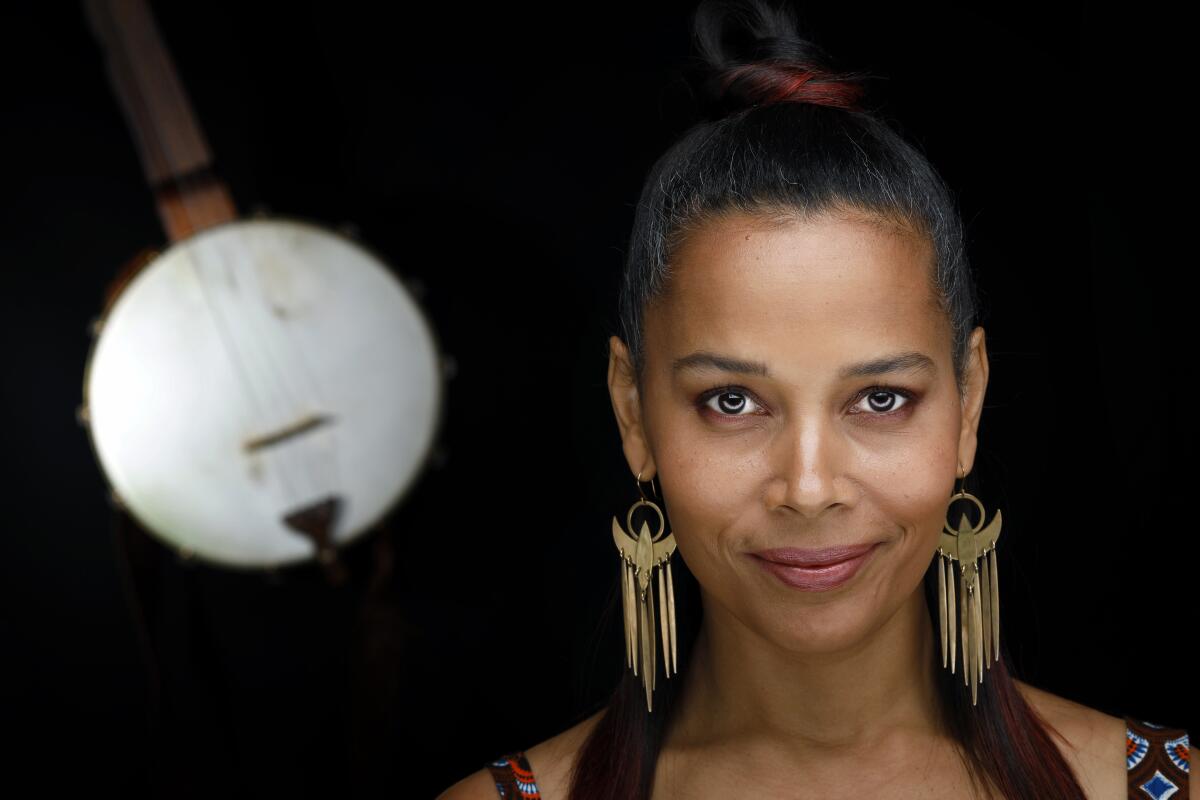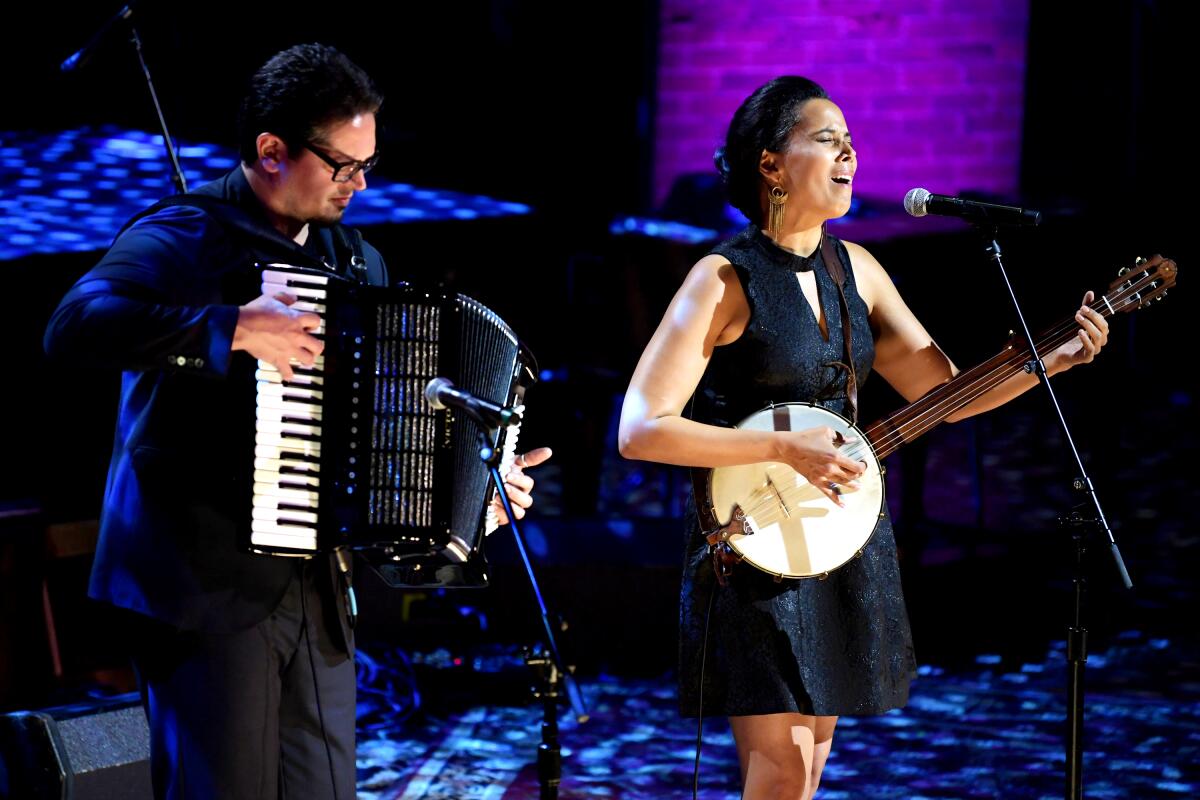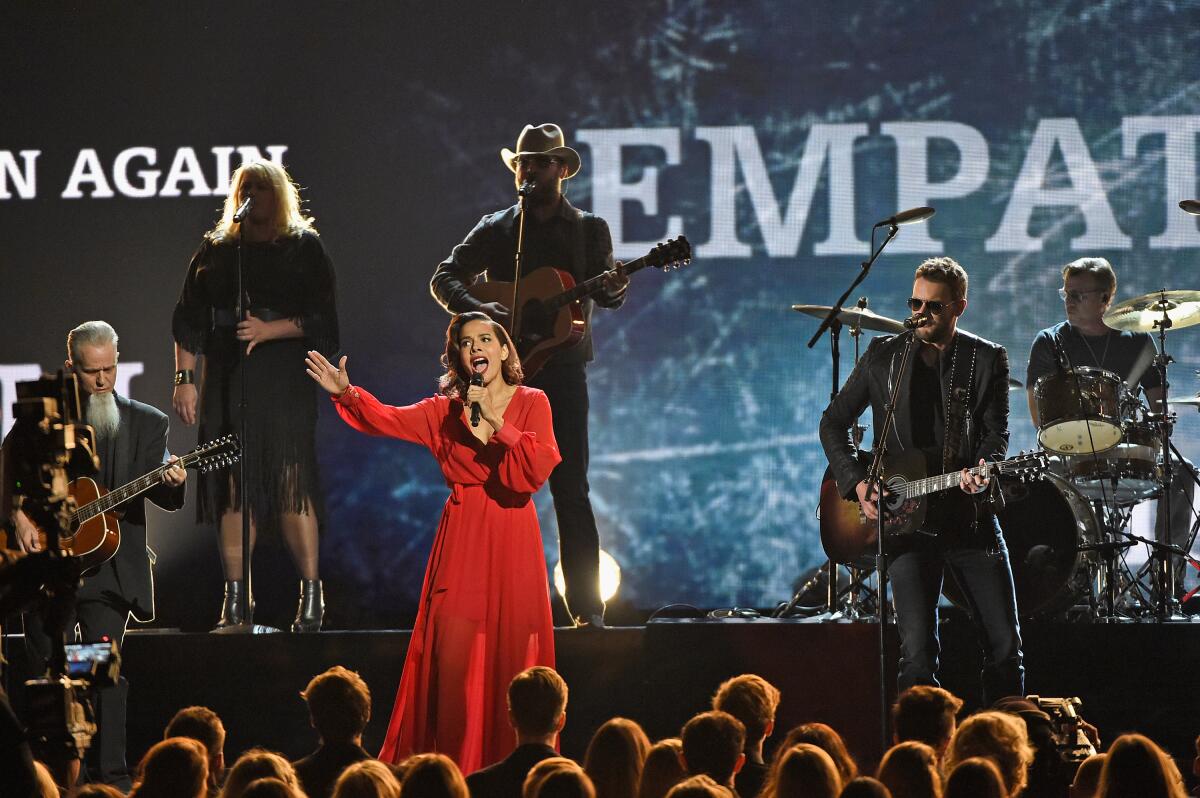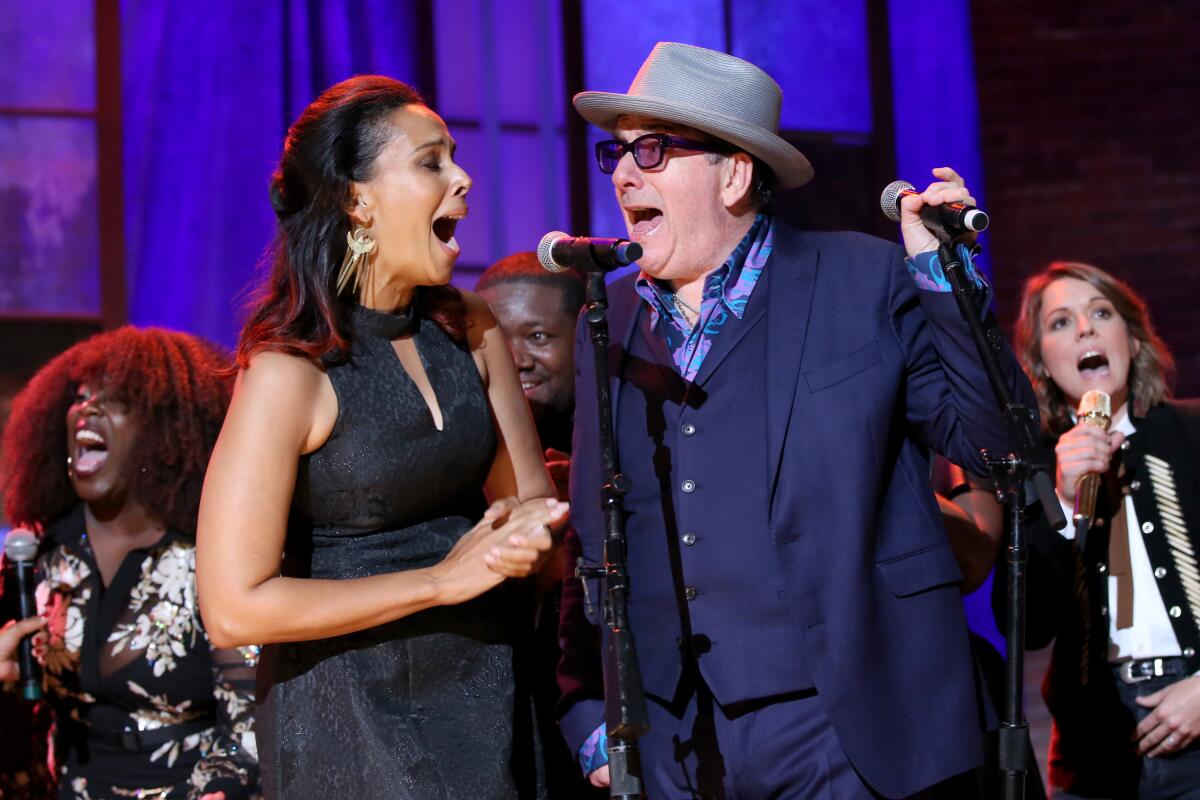The radical inclusiveness of Rhiannon Giddens

- Share via
Like a good gospel preacher mid-sermon, Americana musician Rhiannon Giddens becomes more and more impassioned when she talks about her ongoing efforts — a crusade, one might even call it — to promote the musical contributions of populations that have been overlooked, or, as she puts it, “disappeared.”
“There’s so much push back, even against a simple tweet,” Giddens, 42, said with an even-keeled chuckle. “People who put Europe in the center of the universe, they’re very fragile. They’ll say, ‘You’re so smug, you’re stripping everything away from the Europeans.’ But Europe is merely part of a larger global culture. Anybody who thinks the lute just came out of a vacuum doesn’t know the history.
For the record:
11:42 a.m. Oct. 9, 2019An earlier edition of this post identified the ballerina who danced the lead in the ballet “Lucy Negro, Redux” as Carol Randall Williams. Kayla Rowser was the ballerina. Williams wrote the book for the ballet.
“I’m not trying to strip anybody’s accomplishments from anyone,” she said. “I’m just asking, ‘Can we look at this a little more accurately?’ ”

Her reference to the origins of the lute ties directly to her latest album, “There Is No Other,” her collaboration with Italian jazz-trained multi-instrumentalist Francesco Turrisi, with whom she’s on a U.S. tour that reaches Los Angeles for performances Oct. 19 and 20 at the Pico Union Project downtown. She and Turrisi will also do a Q&A on Oct. 21 at the Grammy Museum.
A couple romantically as well as professionally, Giddens and Turrisi have married their respective fascinations with the roots of their distant homelands on the new album. That project reunited her with American roots musician and producer Joe Henry, who shared a traditional folk album Grammy Award with her and the members of her former band, the Carolina Chocolate Drops, for their 2010 album, “Genuine Negro Jig.”
“Musicians always find these points of connection,” she said of the bracingly eclectic collection that travels from folk-gospel standard “Wayfaring Stranger” to Italian opera composer Gian Carlo Menotti’s aria “Black Swan” to early 20th century singer-songwriter-banjo player Ola Belle Reed’s “Gonna Write Me a Letter” to several of Giddens’ own compositions.

“We all have the same urges: You sing this way, and I play that way. They really go to the same places.”
The diversity of the album’s songs showcases both musicians’ instrumental dexterity — she moves from her main instrument, the minstrel banjo, to violin and viola, while Turrisi hopscotches from accordion, cello, piano, oud and banjo to a variety of percussion instruments including frame drums and the tombak, a Persian hand drum.
The connective thread is Giddens’ commanding and exceptionally versatile and nuanced voice, which has made her one of the most lauded singers of the new millennium.
“It was clear the first time I heard her at rehearsal,” superstar producer T Bone Burnett told The Times about his impetus for drafting her to sing at a multi-artist concert he had organized a few years ago. “Rhiannon is next in a long line of singers that include Marian Anderson, Odetta, Mahalia Jackson, Rosetta Tharpe. She can take this strange music that’s grown out of this convergence of cultures, and take it back around the world. We need that person in our culture.”

That’s precisely what she has continued to do to considerable acclaim on many fronts. The MacArthur Foundation awarded her one of its so-called genius grants in 2017, a $625,000 prize paid in five installments, something that she says hasn’t so much transformed her world as allowed her to continue pursuing projects she’d always envisioned “without having to stress about doing them.”
Those projects include the tour de force album released earlier this year, “Songs of Our Native Daughters,” highlighting songs based on writings of 19th century African American girls and women. Giddens collaborated with three other notable musicians, Amythyst Kiah, Leyla McCalla and Allison Russell, in adding music to century-old letters and poetry expressing the impact of slavery on those women.

The cushion of the MacArthur grant also gave her some financial security as she completed the music for “Lucy Negro, Redux,” the first ballet score written specifically for an African American ballerina, Kayla Rowser, who danced the title role in the work that Nashville Ballet premiered in February. The New York Times called it “the kind of miracle Nashville has never seen before.”
And the MacArthur grant also helps smooth the path as Giddens chips away at her first opera commission, a work slated to premiere next year at the prestigious Spoleto Festival of performing arts in Charleston, S.C.
“I keep starting supergroups, writing ballets and things like that,” she said. “I have to continue to work, and I have to be touring, because that’s how I earn a living. My idea is to spread things out as much as I can. I like to pay people for what they’re worth, and I also have to keep supporting my family while I’m flying back and forth.” (Giddens has a daughter, Aoife, 10 and a son, Caoimhin, 6, from a previous marriage with Irish musician Michael Laffan.)
Her impassioned scholarship spans the rural mountain music of her native North Carolina to the Celtic music in which she immersed herself when she took up part-time residence in Ireland with Laffan, to the classical repertoire she studied while pursuing opera training at the Oberlin Conservatory in Ohio.
Her renown caught the attention of documentary filmmaker Ken Burns, who tapped her for a significant role in his latest series, “Country Music,” now airing on PBS.
“We love her to death,” Burns said in a separate interview. “In her debut, she’s talking off-camera about stuff that ratifies a lot of assumptions people have about country music. Then, we pull back and we see this African American woman with dyed hair, and it helps deconstruct whatever defenses you might have and helps enable people to hear this music.

The singer, songwriter, multi-instrumentalist and music historian has spent much of her life happily transcending barriers separating different realms of music and culture, a proclivity that grew out of her upbringing as the daughter of an Anglo father and African American mother who married shortly after laws banning interracial marriage were struck down in the state.
U.S. history and issues of racism are deeply personal for Giddens and powerfully informed her journey with the Chocolate Drops, a group that researched and brought to the fore the central role African American musicians had in the emergence of string-band music in the U.S. in the 18th and 19th centuries. (Giddens is a banjo nerd who can happily talk all night about the instrument’s origins in Africa.)

For her first post-Chocolate Drops solo album, “Tomorrow Is My Turn” in 2015, she saluted female musicians who had influenced her and shaped popular music socially, politically and/or aesthetically, including Odetta, Edith Piaf, Dolly Parton, Sister Rosetta Tharpe and Nina Simone.
In 2017, she turned to the music of the civil rights movement in “Freedom Highway,” tackling songs she’d written, for the most part.
Finally, she and Turrisi enlisted Joe Henry to help them find a cohesive approach to the vastly disparate source material that captured their fancy.
“I heard it and kind of fell over,” Henry said. “I couldn’t respond fast enough. I told her, ‘However you see this through, I encourage you not to lose your nerve.’ ”
Giddens’ simultaneous quest to move music forward while understanding and honoring the past is a big part of the reason she was recently chosen, along with pioneering 19th century musician Frank Johnson, also from North Carolina, as recipients of the Americana Music Assn.’s inaugural Legacy of Americana Award. The Legacy Award is part of a new partnership with the National Museum of African American Music, scheduled to open next year in Nashville.
The Americana Assn.’s partnership with the African American music museum, and the choice of Giddens and Johnson as the first Legacy award recipients, is seen in some corners as a step in the right direction to begin addressing another racial imbalance.
“The Americana scene is getting better, but it has had its own problematic racial stuff,” said Charles L. Hughes Jr., director of the Lynne & Henry Turley Memphis Center at Rhodes College and author of “Country Soul: Making Music and Making Race in the American South.”

“For a long time, Americana was basically a white space, with just a few black artists in a real rootsy scene often thought as being connected with the music of the past,” Hughes said. “Rhiannon has really forced that issue in a powerful way.”
For her part, in discussing the Legacy Award, Giddens typically redirected the spotlight from herself to Johnson, whose wide-reaching popularity and influence have largely been eliminated from musical histories of the 1800s.
During her acceptance speech, Giddens cited a recent New Yorker profile about her that dug deeply into Johnson’s history, quoting writer John Jeremiah Sullivan: “By any calculus, [Johnson] was one of the first black celebrities in the South ... Johnson went from being hard to find to being impossible to escape. Researching him was like writing a history of baseball and ‘rediscovering’ a hitter named Babe Ruth.”
During our interview, she also spoke of African American musicians highlighted in the Burns’ “Country Music” series, such as Lesley Riddle, who helped Carter Family patriarch A.P. Carter take down songs preserved through generations by oral tradition and bring them to wider audiences.
“So many of them are not just slighted but erased,” she said. “It’s all about what’s being sold, why it’s being sold and who it’s being sold to. Whether it’s money, nationalism, power or whatever, there’s always a reason why a narrative gets foisted upon something that didn’t happen before.”
As that relates to country music, debates over who receives credit creatively — and who profits financially — folds back on her comment about simply wanting to frame the question more honestly.
“I’m still trying to form it so it all makes sense,” she said. “Why is this music so popular? Because it is a music of working-class people coming from different backgrounds and coming into all these amazing things. Who is benefiting from it and who is commodifying it? That’s where it gets into problems. But the music itself is always innocent.”
More to Read
Updates
3:00 p.m. Oct. 9, 2019: This post has been updated with information on Giddens’ appearance Oct. 21 at the Grammy Museum.
The biggest entertainment stories
Get our big stories about Hollywood, film, television, music, arts, culture and more right in your inbox as soon as they publish.
You may occasionally receive promotional content from the Los Angeles Times.











